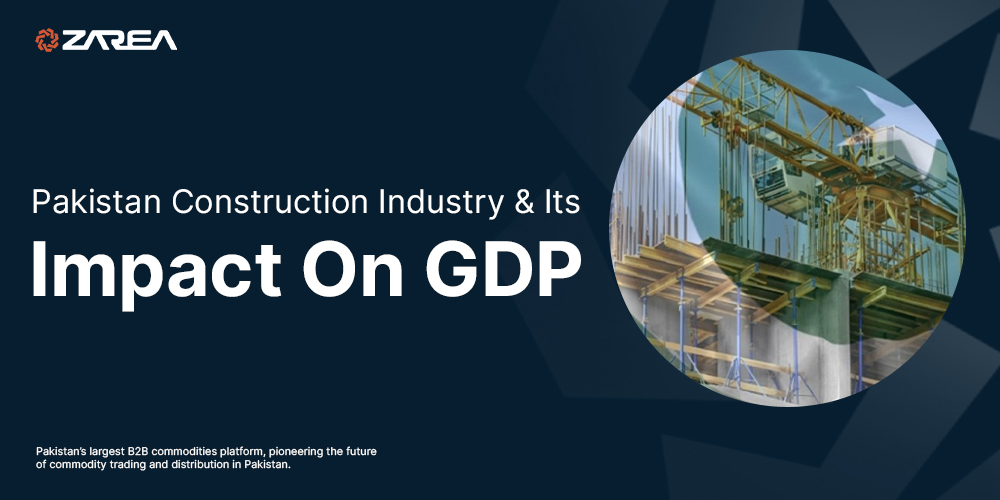Pakistan is a country with a rapidly growing population and an ever-increasing demand for infrastructure development. The construction industry in Pakistan has become a significant contributor to the country’s economy over the past few years. According to the World Bank, the construction industry in Pakistan contributes around 2% of the country’s GDP, and this contribution is expected to grow in the coming years.
In this blog post, we will discuss the construction industry in Pakistan, its impact on the country’s GDP, and the future of the industry.
Overview of the Construction Industry in Pakistan
The construction industry in Pakistan is one of the most significant and rapidly growing industries in the country. The industry has seen significant growth in recent years due to an increase in population, urbanization, and a surge in foreign investment.
The construction industry in Pakistan is broadly divided into two categories: public and private construction. Public construction is mostly undertaken by government bodies and is funded by the government. In contrast, private construction is carried out by private companies and individuals and is financed by banks, investment companies, and other private institutions.
The construction industry in Pakistan encompasses a wide range of activities, including infrastructure development, residential and commercial construction, and industrial construction. The industry employs a large number of workers, ranging from unskilled labor to highly skilled professionals such as architects and engineers.
Impact of the Construction Industry on Pakistan’s GDP
The construction industry in Pakistan has a significant impact on the country’s GDP. The industry’s contribution to the country’s GDP has been steadily increasing over the past few years, and it is expected to continue to do so in the future.
According to the State Bank of Pakistan, the construction industry in Pakistan contributed around 9.6% to the country’s GDP in 2020. This is a significant increase from the 6.5% contribution the industry made in 2018. This growth is due to increased investment in the industry, a surge in infrastructure development, and an increase in the number of residential and commercial construction projects.
The construction industry also has a significant impact on employment in Pakistan. The industry is one of the largest employers in the country, providing jobs to a wide range of workers, including unskilled laborers, skilled workers, and highly educated professionals such as architects and engineers. The industry has the potential to create even more jobs in the future as the demand for construction continues to increase.
Challenges Facing the Construction Industry in Pakistan
Despite the rapid growth of the construction industry in Pakistan, there are several challenges that the industry faces. These challenges include:
- Lack of skilled labor: The construction industry in Pakistan faces a shortage of skilled labor, particularly in specialized fields such as architecture and engineering.
- Lack of investment: The construction industry in Pakistan needs more investment to continue to grow and meet the country’s infrastructure needs.
- Government policies: The government’s policies regarding the construction industry can be uncertain and change frequently, making it difficult for companies to plan and execute long-term projects.
- Corruption: Corruption is a significant issue in the construction industry in Pakistan, leading to delays, increased costs, and substandard work.
Future of the Construction Industry in Pakistan
Despite the challenges facing the construction industry in Pakistan, the industry’s future looks bright. The government has identified the construction industry as a priority sector for development, and it has introduced policies and initiatives to support the industry’s growth.
One such initiative is the “Naya Pakistan Housing Programme,” which aims to build five million affordable homes in the country over the next five years.
The program will create jobs and increase demand for construction materials, boosting the construction industry’s growth.
Another initiative is the China-Pakistan Economic Corridor (CPEC), which includes the development of infrastructure projects such as highways, railways, and ports. CPEC has already generated significant investment in the construction industry in Pakistan and has the potential to drive even more growth in the future.
Furthermore, Pakistan’s growing population and urbanization trends are expected to fuel demand for infrastructure and housing, providing even more opportunities for the construction industry to grow and contribute to the country’s economy.
Conclusion
The construction industry in Pakistan is a significant contributor to the country’s economy, and its contribution is expected to grow in the future. The industry provides jobs to a large number of workers and is responsible for infrastructure development, residential and commercial construction, and industrial construction.
Although the industry faces several challenges, the government has identified it as a priority sector for development and has introduced policies and initiatives to support its growth. With the right investments and policies in place, the construction industry in Pakistan has the potential to drive significant economic growth and improve the standard of living for the country’s citizens.

































